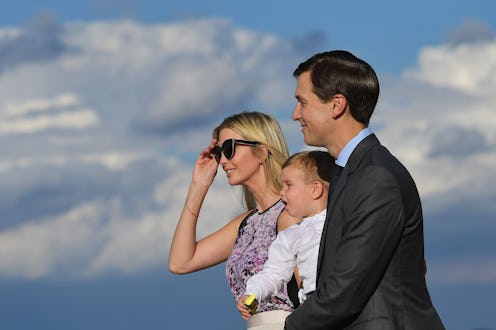News
Ivanka Opens Up About Her Postpartum Depression: "It Was A Very Challenging, Emotional Time"

For most of President Trump's multiple decade foray through the limelight, his elder daughter Ivanka has been a regular presence by his side. She is often recognized as Trump's "favorite child," even by her siblings, a distinction that seems accurate given her West Wing position as adviser to the POTUS. The 35-year-old mother of three is said to hold real sway over her father, and made it clear early on she would push for certain policies, such as better work benefits for mothers. The realities of motherhood are personal for Trump, who revealed to Dr. Oz she struggled with "some level" of postpartum depression following the birth of all three of her children.
Speaking in a segment that will air Thursday, Trump opened up about an experience millions of mothers will recognize. "It was very – it was a very challenging, emotional time for me because I felt like I was not living up to my potential as a parent or as an entrepreneur and an executive," said Trump, echoing a common sentiment for new moms who struggle with postpartum depression. Trump went on, "And I had had such easy pregnancies, that in some way the juxtaposition hit me even harder."
Trump has three children — Arabella, 6, Joseph, 3, and Theodore, 16 months. Speaking with People Magazine while on the campaign trail with her father in 2016, Trump acknowledged the intentionality she felt was required to be a mother, a CEO of a thriving business, and an on-the-road political adviser/support system. "I want my children to see me first every morning, so I wake up at 5 and make sure to shower and exercise before they get up," she said of her morning routine. Trump also admitted, "My life is chaotic right now. I'm exhausted 90 percent of the time."
During the presidential campaign, Trump ran an ad for her father that opened with the line "The most important job any woman can have is being a mother." She went on to highlight herself as an example of someone taking both parenting and her career seriously, while promising a President Trump would fight for better maternal leave policies, childcare tax credits, and dependent care savings accounts.
As a mother and career woman, Ivanka Trump has chosen a very public role as advocate for fellow working moms. It should be noted, the policies she voiced support for during and since Trump's campaign in favor of better pay and options for working mothers are not typically Republican talking points.
Trump's admission that she struggled with postpartum depression may give other women who feel ashamed or are in denial about their own similar experience the courage to speak out and seek help.
According to the American Psychological Association, up to 1 in 7 mothers will have some degree of postpartum depression. The disease can be debilitating for many new moms, who are already dealing with adjusting to a newborn baby. Panic attacks, constant anxiety, feelings of worthlessness, uncontrollable sadness are listed as symptoms, alongside the simply put experience of "misery." Postpartum depression can be dangerous for women, especially if they do not get proper help.
Despite a range of public figures speaking up about their own postpartum experiences, from Gwyneth Paltrow to Alanis Morissette to Chrissy Tiegan, many new moms still feel a stigma about admitting they are struggling — and not without reason. Society hasn't necessarily reached a point of knowledge and compassion where postpartum depression is concerned.
So it is encouraging to hear Ivanka Trump be frank about her own experiences following giving birth. It's the kind of candid talk many would no doubt welcome her to engage in at her day job, too.